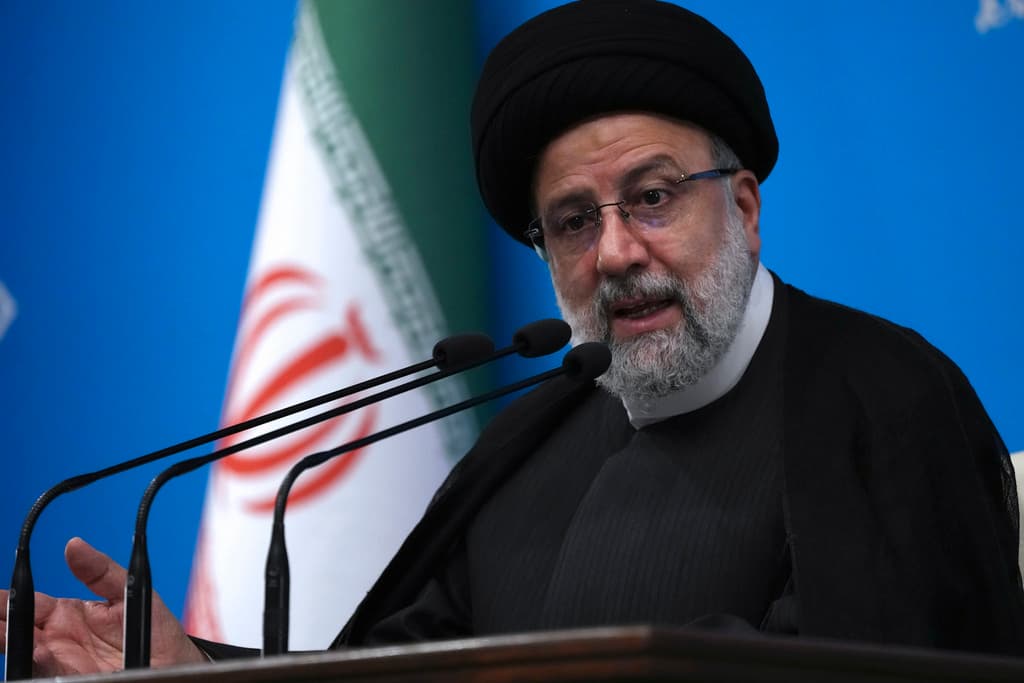Biden Administration’s Iran Hostage Deal a ‘Slap in the Face,’ Dissidents Say
The swap-and-ransom deal is completed at the same time that Iranian enforcers prepared to clamp down on renewed protests in the wake of the anniversary of 22-year-old Mahsa Amini’s death.

Flying on an airline that is under American sanctions, Iran’s president — who has also been sanctioned by Washington — lands at New York Monday as President Biden erodes the Iran sanctions regime by completing a $6 billion hostage deal that regime opponents consider a “slap in the face.”
Five Americans who for years have been held on spurious charges at the notorious Evin prison left Iran Monday. The release occurred after Tehran verified that $6 billion has been deposited in a bank at Doha, Qatar, after it had been frozen in South Korean banks as part of sanctions on Iran’s oil sales proceeds.
In addition, five Iranians who had been jailed in America on sanctions violations charges, including attempts to furnish illicit components for the Islamic Republic’s nuclear and ballistic missile programs, were let go. The swap-and-ransom deal was completed at the same time that regime enforcers prepared to clamp down on renewed protests in the wake of the anniversary of 22-year-old Mahsa Amini’s death.
Amini’s September 16, 2022, killing at the hands of Iran’s “morality police” has sparked waves of anti-regime protest that are centered on opposition to laws forcing women to cover their hair in public. For a year, the regime has been shooting at, maiming, imprisoning, and hanging the protesters.
The $6 billion deal completed Monday is “a gift from the U.S. government to the butcher of Iran, right on the Mahsa anniversary,” a pioneer of Iran’s anti-hijab movement, Masih Alinejad, tells the Sun. “It’s a slap in the face of Iranian women.”
Over the weekend, Ms. Alinejad disclosed on X that the Biden administration has told her that there were at least 31 recent attempts on her life by Tehran’s emissaries, and it advised her to hide under the federal witness protection program, which would silence her. “This is what the regime wants,” she wrote.
“I have no fear for my own life,” she told the Sun. “It’s about the national security of my adopted country. No American will be safe when the killers are welcomed by the U.S. government on U.S. soil.”
In 2019, Mr. Raisi was sanctioned by the Department of Treasury for his role in three decades’ worth of human right violations, including his leadership of “death commissions” in the late 1980s, which earned him the “Tehran hangman” nickname.
Mr. Raisi flew in from Iran Monday on a jet owned by Meraj Airline, which was sanctioned by the Obama administration in 2014 for transferring illicit arms to Syria and elsewhere. In town to attend the United Nations General Assembly debate, he is expected to meet at least three American groups, including the Council on Foreign Relations, which has invited him for a “Dialog.”
The Department of State has imposed a restriction that limits Mr. Raisi’s travel to the immediate proximity of the UN’s Turtle Bay headquarters. His arrival coincided with the news of the hostage deal’s completion.
“From day one of this Administration, the President and I have made clear that we have no higher priority than the safety and security of U.S. citizens at home and abroad,” Secretary Blinken said in a statement Monday.
Yet, at least two imprisoned Americans were not included in the deal. “My father is in a very serious predicament right now,” the son of Shahab Dalili, Darian, tells the Sun. While he welcomed the release of five hostages, the younger Mr. Dalili added, “I need America to come to the aid of my father, and to find a better way to secure the release and stop hostage-taking by Iran.”
The Department of State claims that Shahab Dalili was not included in the $6 billion deal because it is yet to be determined whether he was “wrongfully detained” when arrested in 2016 after attending a funeral in Iran. According to the 2020 Levinson Act, permanent residents like Mr. Dalili pere must be brought home safely.
In his statement, Mr. Blinken noted that the act’s namesake, Robert Levinson, who disappeared in 2007 while on Iran’s Kish Island, remains unaccounted for. In that connection, the state department announced Monday new sanctions on the Iranian president at that time, Mahmoud Ahmadinejad. Currently isolated and silenced by the regime, Mr. Ahmadinejad no longer has influence at Tehran.
As it sanctioned a has-been, Washington started unfreezing several funds held in banks in Iraq and elsewhere, which like the $6 billion South Korean account had been held as part of imposed sanctions on Iran. In addition to the funds released as part of the hostage exchange, such sanction easing adds up to at least $16 billion. Lax enforcement of America’s ban on Iranian oil exports enriches Tehran coffers by tens of billions of dollars more.
Sanction erosion, as in the hostage deal, “is a total betrayal to the American people,” Ms. Alinejad says. “America is all about democracy, but now the American government is bowing to the killers and legitimizes hostage diplomacy.”

